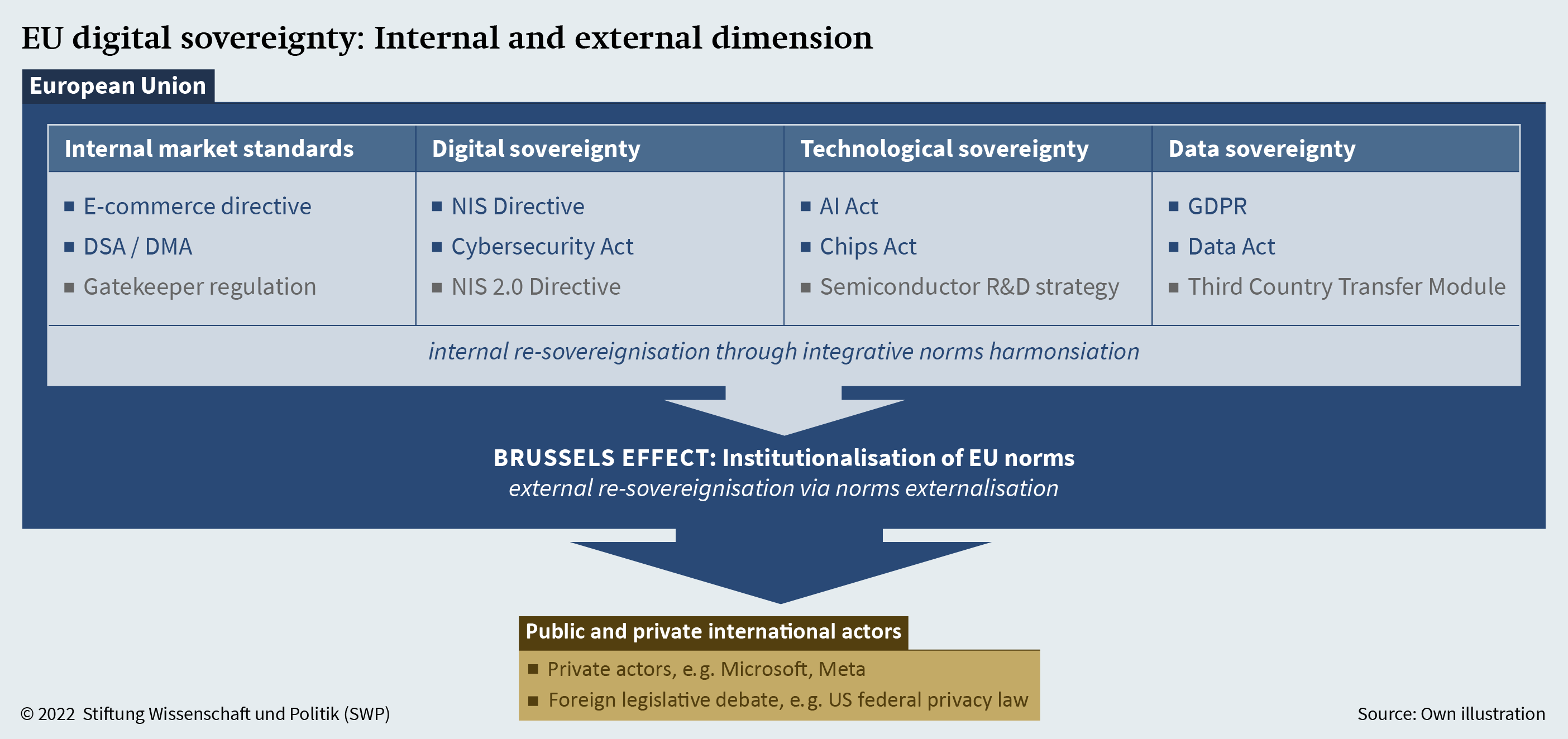
17 Mar Advancing European Internal and External Digital Sovereignty
The Brussels Effect and the EU-US Trade and Technology Council
We have read this article and recommend it to our community. The article “Advancing European Internal and External Digital Sovereignty” discusses the importance of understanding European sovereignty in the digital age, encompassing both internal and external dimensions of European action. It emphasizes the need for an appropriate understanding of European sovereignty in the digital age, which refers equally to the member state, Europe, and the transatlantic digital market.
The COVID-19 pandemic has revealed vulnerabilities of international supply chains and accelerated digitalization, prompting European policymakers to continue pursuing their digital foreign policy strategy of advancing digital sovereignty. The EU-initiated transatlantic Trade and Technology Council (TTC) was established to navigate European and American understandings of ‘digital sovereignty’ and the resulting market regulations. The article also highlights the concept of “digital sovereignty” as a declared goal of the German EU Council Presidency, emphasizing the need for a better awareness and control of dependencies in central elements of the digital infrastructure.
The article emphasizes the importance of advancing strategic sovereignty, particularly in the context of the Ukraine war, and the need for Berlin and Paris to protect the interests of all member states jointly at the European level. It also discusses the concept of “digital sovereignty” as a European public good, with Chancellor Merkel emphasizing the need for Europe to become technologically and digitally sovereign. The popularity of the concept of “digital sovereignty” has increased in recent years, although it is rarely clearly defined. The article also addresses the conflict of interest between the development of the EU Energy Union and individual states’ efforts to achieve greater energy sovereignty.
Furthermore, the article discusses the formulation of a concrete strategy to realize the common European vision of Digital Sovereignty, emphasizing the need for practical solutions to address technology dependencies in the digital sphere and promote prosperity through international cooperation and the global division of labor. It also reflects on the risks emerging in the new energy landscape and assesses the ability of existing institutions and tools of governance to address them, aiming to describe the risk landscape and governance shortcomings and identify actions the EU can take to improve its existing external energy governance and empower existing institutions to address these risks.
Overall, the article provides insights into the multifaceted dimensions of European internal and external digital sovereignty, emphasizing the need for a comprehensive understanding and strategic approach to address the challenges and opportunities in the digital age.
The key points include:
-
Importance of Digital Sovereignty: The article emphasizes the significance of understanding European sovereignty in the digital age, encompassing both internal and external dimensions of European action.
-
COVID-19 Impact: The COVID-19 pandemic has accelerated digitalization and revealed vulnerabilities of international supply chains, prompting European policymakers to continue pursuing their digital foreign policy strategy of advancing digital sovereignty.
-
Transatlantic Trade and Technology Council (TTC): The EU-initiated TTC was established to navigate European and American understandings of ‘digital sovereignty’ and the resulting market regulations.
-
German EU Council Presidency: The concept of “digital sovereignty” was a declared goal of the German EU Council Presidency, emphasizing the need for better awareness and control of dependencies in central elements of the digital infrastructure.
-
Strategic Sovereignty: Emphasis on the importance of advancing strategic sovereignty, particularly in the context of the Ukraine war, and the need for joint protection of the interests of all member states at the European level.
-
European Public Good: The article discusses “digital sovereignty” as a European public good, with a focus on the need for Europe to become technologically and digitally sovereign.
-
Risks and Governance: Reflection on the risks emerging in the new energy landscape and assessment of the ability of existing institutions and tools of governance to address them.
These key points provide insights into the multifaceted dimensions of European internal and external digital sovereignty, emphasizing the need for a comprehensive understanding and strategic approach to address the challenges and opportunities in the digital age.


